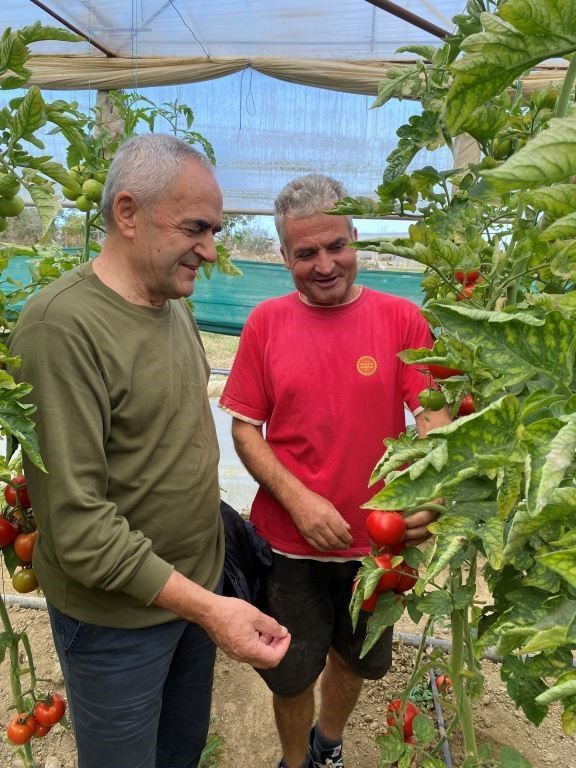
It all began in 2021 when GOPA AFC was awarded a contract by Deutsche Gesellschaft für Internationale Zusammenarbeit (GIZ) GmbH to provide technical expertise to the Sustainable Rural Development Project, implemented by GIZ Albania funded by the Federal Ministry for Economic Cooperation and Development (BMZ), the Swiss Agency for Development and Cooperation and UK International Development, the tomato leafminer moth, Tuta absoluta, started causing major problems in Albanian greenhouses. Originally from South America, it spread across the Mediterranean region from west to east. The pest showed resistance to many pesticides, leading farmers to spray a wide range of pesticides in large quantities. Consequently, high pesticide residues appeared in the produce, which was poorly received by Albania’s export market.
The project responded to this challenge by introducing p.heromone traps to attract male Tuta moths, thereby controlling the pest population in several demonstration sites. This was combined with the biopesticide Bacillus thuringiensis (B.t.). As a result, the number of pesticide applications against Tuta was more than halved. However, whiteflies then became an issue, prompting farmers to spray pesticides to control them.
In 2022, GOPA AFC organized a trial shipment of beneficial insects (BCOs = biological control organisms) to release them in demonstration greenhouses for the control of whiteflies, leafminers, and aphids, which had also started to become a problem. However, most farmers did not trust the effectiveness of this control method and continued to use pesticides, often those that were not compatible with the BCOs.
It was then understood that biological control is primarily a matter of knowledge, attitude, and confidence. Therefore, in 2023, 87 greenhouse farms interested in using BCOs were instructed on the correct management of BCOs and were made aware of the risks of using pesticides. GOPA AFC linked them to three Albanian input providers who became partners of different European producers of BCOs. As a result, the vast majority of growers produced crops with pests at acceptable levels, low pesticide residues, and good harvests and returns.
In this way, the first step of introducing BCOs in greenhouse production was successfully taken. We must admit, however, that the widespread use of commercially available bumblebees for pollination since 2012 has certainly helped with the logistics needed to get BCOs into the greenhouses alive and on time, it also prepared the mindset of farmers to properly manage BCOs. As with the use of bumblebees, pesticides must be used with great care as well.
To establish a sound system of managing BCOs that can be replicated in greenhouses of farmers supplied by different input providers, a consistent monitoring approach was developed and tested. The consultants of GOPA AFC selected a number of young agronomists who were trained and coached in scouting and monitoring.
Building on the 2023 experience, a campaign of Friday-evening talks in local coffee bars was conducted in 2024. A film explaining the main points of biological control was shown, often followed by very active discussions. Furthermore, brochures were distributed during these events and at other places of interest to farmers. We also observed that farmers who successfully used biological control were often instrumental in convincing their peer farmers to change their method of pest control.
In 2024, 157 farmers used commercial BCOs in their greenhouses. During the pilots and demonstrations, we observed that with reduced use of pesticides, naturally occurring beneficial organisms (mainly the mirid bug Nesidiocoris tenuis) entered the greenhouses and proved to be very effective against some of the major pests. GOPA AFC is now following 35 greenhouse farmers who practice biological control relying mainly on naturally occurring, spontaneous beneficials.
In 2024, pesticide residue analyses of crops with conventional pest control detected three times the amount of pesticide than in vegetables grown with BCOs. Therefore, biological control has proven to make a significant difference. Yet, as the crops are not yet residue-free, we still have a fair way to go.
Fore more information on the project please contact: ninakristin.thurn [at] gopa-afc.de
